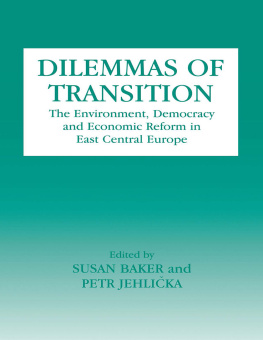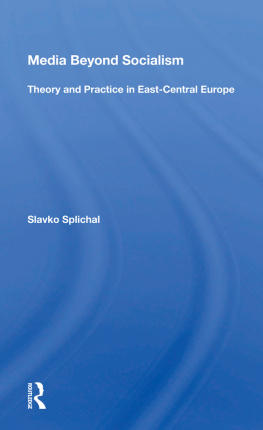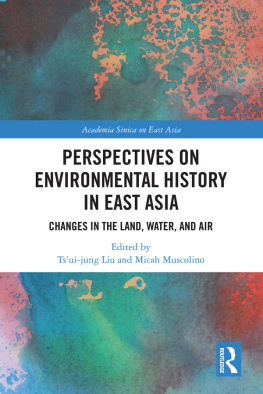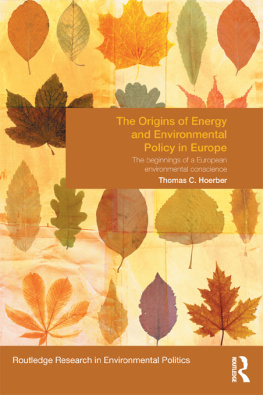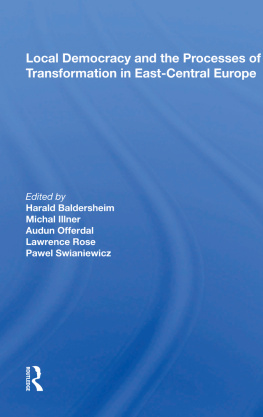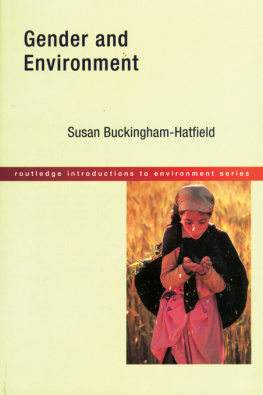DILEMMAS OF TRANSITION: THE ENVIRONMENT, DEMOCRACY AND ECONOMIC REFORM IN EAST CENTRAL EUROPE
Of Related Interest
A GREEN DIMENSION FOR THE EUROPEAN COMMUNITY
Political Issues and Processes
edited by David Judge
SUSTAINABLE DEVELOPMENT IN WESTERN EUROPE
Coming to Terms with Agenda 21
edited by Tim O'Riordan and Heather Voisey
RIO: UNRAVELLING THE CONSEQUENCES
edited by Caroline Thomas
NETWORKS FOR WATER POLICY
A Comparative Perspective
edited by H. Bressers, L.J. O'Toole, Jr. and J. Richardson
ECOLOGY AND DEMOCRACY
edited by Freya Mathews
Dilemmas of Transition
The Environment, Democracy and Economic Reform in East Central Europe
edited by
Susan Baker
and
Petr Jehlika
First published in 1998 in Great Britain by
FRANK CASS PUBLISHERS
Published 2015 by Routledge
2 Park Square, Milton Park, Abingdon, Oxon OX14 4RN
711 Third Avenue, New York, NY 10017 USA
Transferred to Digital Printing 2005
Routledge is an imprint of the Taylor & Francis Group, an informabusiness
Copyright 1998 Taylor & Francis.
British Library Cataloguing in Publication Data
Dilemmas of transition: the environment, democracy and economic reform in East Central Europe
1. Environmental economics Europe, Central 2. Democracy Europe, Central 3. Post-communism Europe, Central 4. Europe, Central Economic conditions
I.Baker, Susan II.Jehlika, Petr
330/9'43'009049
ISBN 978 0 7146 4764 7 (cloth)
ISBN 978 0 7146 4310 6 (paper)
ISBN 978 0 2030 4439 1 (eISBN)
Library of Congress Cataloging in Publication Data
Dilemmas of transition: the environment, democracy and economic reform in East Central Europe / edited by Susan Baker and Petr Jehlika.
p. cm.
"Special issue of the journal Environmental politics v. 7, no. 1, 1998."
Includes bibliographical references and index.
ISBN 0-7146-4764-0 (cloth). ISBN 0-7146-4310-6 (pbk.)
1. Environmental policy Europe, Eastern. 2. Environmental policy Europe, Eastern Cass studies. 3. Europe, Eastern Economic policy 1989- 4. Democracy Europe, Eastern. 5. European Union countries foreign relations Europe, Eastern. 6. Europe, EasternForeign relations European Union countries. I. Baker, Susan. II. Jehlika, Petr. 1965
GE190.E852D55 1998
363.7'00947dc21
98-17800
CIP
This group of studies first appeared in a Special Issue: 'Dilemmas of Transition: The Environment, Democracy and Economic Reform in East Central Europe' of Environmental Politics (ISSN 0964-4016) 7/1 Spring 1998 published by Frank Cass.
All rights reserved. No part of this publication may be reproduced, stored in or introduced into a retrieval system or transmitted, in anyform or by any means, electronic, mechanical, photocopying, recording or otherwise without the prior written permission of the publisher of this book.
Contents
| Susan Baker and Petr Jehlika |
| Michael Waller |
| Ans Kolk and Ewout van der Weij |
| Barbara Jancar-Webster |
| Laurence J. O'Toole, Jr. and Kenneth Hanf |
| Adam Fagin and Petr Jehlika |
| Juraj Podoba |
| Frances Millard |
| Simina Dragomirescu, Cristina Muica and David Turnock |
| Susan Baker and Bernd Baumgartl |
SUSAN BAKER and PETR JEHLIKA
The Empirical Focus
This collection of essays is concerned with the impact of the twin processes of democratisation and marketisation on the environment in a number of countries from the former Soviet bloc. There are three environmental matters which we investigated: how the twin processes of change have effected (1) the physical environment; (2) the expression of environmental interests; and (3) the effectiveness of environmental management policies.
We began with a search for a common term to refer to the countries under study. 'Eastern Europe' was a term once in common use to refer to European countries under Soviet-dominated Communist regimes. However, as Tellegen [ 1996 ] has pointed out, it now seems odd to refer to the very small part of Europe that lies west of the former Iron Curtain as 'Western Europe' and to use the term 'Eastern Europe' to refer to the immense area between Germany and Asian Russia. We accept Tellegen's point that clearly there is need to differentiate. Furthermore, we believe that the term Eastern Europe is too associated with the period of Soviet rule to be useful for discussion of the processes of change these countries are undergoing in the period of post-Communist transition.
In keeping with the current trend, we have adopted the term East Central Europe (ECE) to refer to the countries under study here. The countries that comprise ECE are Poland, the Czech and Slovak Republics, Hungary, Romania, Bulgaria, the former East Germany, Albania and the former Yugoslavia (now broken into Slovenia, Croatia, Bosnia-Herzegovina, Macedonia and the rump of Yugoslavia, Serbia and Montenegro). The Baltic countries of Estonia, Latvia and Lithuania are excluded from this category, on the grounds that they were part of the USSR itself and had consequently rather different post-war histories..
Not all of the countries that we categorise as comprising ECE are, however, covered in this volume. Our choice is limited by our research focus. In particular, it is limited by the existence of a secondary aim for this volume, namely to analyse the involvement of the West, in particular the European Union (EU), in the transformation process in ECE countries. To capture this influence, we have chosen to focus on those ECE countries who are actively involved in seeking membership of the EU and for whom the EU has responded positively, albeit at times cautiously.
First, there are European post-Communist countnes in which the process of democratisation, after an initial promising start, has been slowed down or even reversed. The democratic character of Albania and several succession states of the other former Yugoslavia - Serbia and Montenegro, Croatia as well as war-torn Bosnia-Herzegovina - hold few democratic credentials. This renders their effort to join Western European organisations, such as the EU, meaningless unless fundamental changes are made. This does not hold true for Slovenia, but it has been excluded from analysis because of the fragile nature of the political situation in the former Yugoslavia.
This process of elimination left us with a group of six countries Poland, the Czech Republic, Slovakia, Hungary, Romania and Bulgaria - to be examined. All were independent countries in the post-war period, with the exception of Czechoslovakia which peacefully divided into Slovakia and the Czech Republic. They were all members of the Warsaw Pact and the Council for Mutual Economic Assistance (Comecon). In their post-1989 history they have engaged in a process of political and economic reform, including democratisation and marketisation, albeit with different speeds and priorities. Although the timing within which full membership will be gained differs among them, all six countries are now Associate Members of the European Union, as well as candidates for NATO membership.
While using a collective term to cover the whole area, the editors are aware that very large differences exist among the countries covered by the term ECE. Historically, country experiences differ widely, with Bulgaria, for example, under Ottoman rule while further north the influence of the Habsburg Empire shaped the emergence of today's states. There were also different experiences under Communism, obscured by the fact that during this period the West saw only a uniformity in the region because of its strategic definition of Eastern Europe as the enemy. This masked large differences, not least in term of industrialisation (Waller).divisions. Yet, despite this diversity, the authors believe that the region has sufficient similarities to justify this comparative project. Countries in this region have a shared experience of Communism and life under Soviet influence, resulting in a centralised state and weak civil society. Since 1989 all have carried out a process of transition to marketisation and democratisation. It is, as Waller and Millard have pointed out, their shared Communist experience that justifies the collective use of the term for societies whose histories before the Communist takeover were very varied and whose post-Communist experiences are leading to quite marked divergences [ Waller and Millard, 1992: 164 ].

